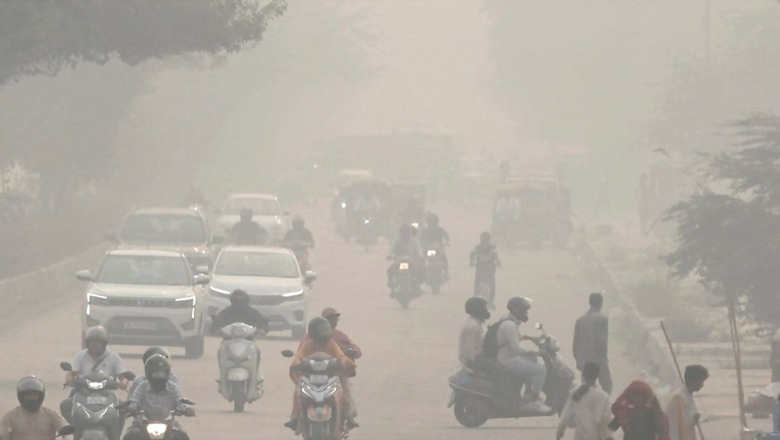
views
It’s that familiar feeling of déjà vu once again. It’s festival time in the national capital, and it’s also the time for polluted air to cast a gloom over the region. The courts are repeatedly reprimanding government agencies to take action, while leaders are busy blaming everyone but themselves for the poison in the air.
As Delhi’s average Air Quality Index (AQI) rose to 310, placing it in the “very poor” category, the Commission for Air Quality Management (CAQM) earlier this week ordered the implementation of the Graded Response Action Plan (GRAP) Stage II in Delhi-NCR. With the imposition of the second stage of GRAP, the use of coal and firewood, including in tandoors at hotels, restaurants, and open eateries, as well as diesel generator sets (except for emergency and essential services), has been banned. Crackers and other such fireworks have already been prohibited.
Delhi Chief Minister Atishi likely anticipated this and was quick to make a statement a day earlier, blaming the neighbouring states (except Punjab, which is ruled by the Aam Aadmi Party) for the toxic air in the national capital. Atishi stated, “Delhi has seen a spike in both air and water pollution in the last few days… Today, I want to tell all Delhiites that the real reason for the increase in air and water pollution is the dirty politics of the BJP.”
Delhi CM went on to say that the Indian Agricultural Research Institute (IARI) presents data on stubble burning cases daily. According to her, IARI figures show that from 1st to 15th October 2023, 1,123 incidents of farm fires were reported in Punjab, which decreased by 27 per cent to 811 this year. She claimed that the figures indicated an increase in farm fires in BJP-ruled Haryana and Uttar Pradesh, with cases in Haryana rising from 341 to 417, while in UP the number went up from 244 to 417 between 1st and 15th October, compared to last year.
Experts suggest it is highly unlikely that farm fire fumes from Uttar Pradesh could travel to the national capital. The fumes generally travel in a north-west to south-east direction, and since Uttar Pradesh is on the south-east side of Delhi, the possibility of winds carrying fumes in reverse is very slim. In fact, the fumes tend to dissipate when entering the wide Ganga-Yamuna Doab area of Uttar Pradesh.
The UP government has also claimed that in the past seven years, incidents of stubble burning in the state have reduced by over 46 per cent, making it highly unlikely that farm fire fumes from UP could cause pollution in Delhi. Additionally, the UP government stated that processing farm waste in plants has made the state the largest producer of Compressed Biogas (CBG).
There are 24 units of CBG-producing plants already operating in the state, with another 93 units likely to become operational over the next few years. The Ministry of Road Transport and Highways, through a notification, has already permitted the use of bio-compressed natural gas (bio-CNG) in motor vehicles as an alternative to compressed natural gas (CNG).
On the other hand, while the Centre has sanctioned the establishment of CBG plants in 14 districts of Punjab, production in the state remains insignificant. A total of 78 CBG plants have been sanctioned for Punjab, of which only eight are functional. Construction has not yet begun on 54 of the 78 planned plants.
Scientists believe that the long-term solution to the problem of stubble burning lies in profitably processing farm waste. This can only be achieved if the government purchases the waste for productive use. While a policy has been formulated by the Centre and passed on to the states with financial and technical support, Punjab has been the biggest culprit. Despite the Centre’s assistance, the state has faltered in processing farm waste.
The Aam Aadmi Party (AAP) leadership, instead of conducting proper due diligence, has once again chosen the easy way out, as they often do, by blaming rival parties and states governed by them. They also resort to short-term measures, much to the inconvenience of the common people, such as suggesting the imposition of a congestion tax on vehicle owners, implementing the odd-even car rationing scheme, or launching more visible but largely ineffective campaigns like shutting off vehicles at red lights. While such plans may bring some temporary employment for AAP volunteers, they fail to address the core issue.
The Supreme Court, while monitoring the various measures taken to control farm fires, should also require states to submit regular progress reports on the construction of farm waste processing units. The long-term solution to the problem of polluted air in the National Capital Region lies not in forcing farmers to extinguish farm waste fires, but in encouraging them to sell the waste to CBG-producing agencies.
However, for this ideal scenario to materialise, state governments, particularly the Punjab government, must rise to the challenge and make all 78 sanctioned plants operational as soon as possible. The AAP leadership could either focus on accelerating the establishment of these plants or continue to blame others for the failings of their party’s government.
The writer is author and president, Centre for Reforms, Development & Justice. Views expressed in the above piece are personal and solely those of the author. They do not necessarily reflect News18’s views.


















Comments
0 comment